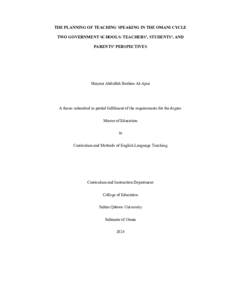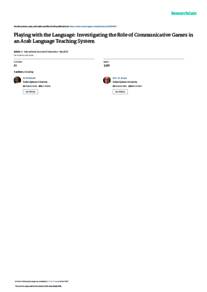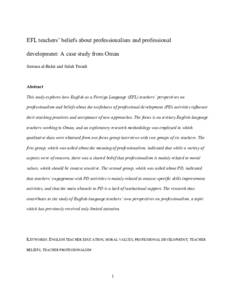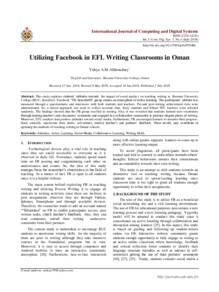وثيقة
The Planning of teaching speaking in the Omani cycle two government schools : teachers, students and parents perspectives.
المصدر
Master's thesis
عناوين أخرى
التخطيط لتدريس مهارة التحدث في المدارس الحكومية العمانية للحلقة الثانية : وجهة نظر المعلمين والطلاب وأولياء الأمور
الدولة
Oman
مكان النشر
Muscat
الناشر
Sultan Qaboos University
ميلادي
2024
اللغة
الأنجليزية
الموضوع
نوع الرسالة الجامعية
Master's thesis
الملخص الإنجليزي
An ample number of local and broad studies have embraced the issues pertinent to the
speaking proficiency of L2/FL learners of English. Yet, scant research has been
administered on the planning of teaching speaking lessons in the current classes of
Public Schools. Adopting a qualitative case study design, the study utilized in-depth
interviews (IDI) with three Grade 10 teachers with variant years of experience, four
Grade 10 learners with proficient speaking ability and three Grade 10 mute EFL
learners with variant speaking levels. It further obtained data from a focused- group
(FG) consisting of three parents as well as a deep analysis of the English Language
Curriculum Framework (ELCF) and three official documents inscribed by the MoE.
Applying critical discourse analysis (CDA) as the primary approach to data collection,
the current research adds to the literature by examining the planning of teaching
speaking in the Omani Cycle Two Government Schools. It particularly targeted the
factors behind the phenomenon of mute EFL learners and pursued how well (in-class)
speaking practices serve students with proficient speaking. It particularly tackled the
Omani policy texts pertinent to teaching speaking and determined the extent to which
they were in harmony or conflict with the discourses gained from the selected
educational agents (teachers, students and parents). Taking the issue of social justice
and the three mainstream ideologies (meritocracy, neoliberalism and culturalism) into
the first consideration, the two unprivileged groups (mute and skilled speakers) were
the prime focus of this study. The findings revealed that the informants discourses and the ELCF's principles are aligned in commodifying ELT. This appeared when both shared an equal vision in valuing and prioritizing EL speaking for career, business and financial motives. This
ascertains that the planning of EL is subjected to ideologically infused practices and policies and the the MoE's polices pertinent to ELT are issued according to the Omani government's neolibral targets. However the ELCF's promising goals pertinent to the planning of teaching speaking, particularly the sensitivity to individual
differences, the proper use of resources, the reliability of assessment and the adequacy
of curriculum mismatched the actual practice. The extreme influence of neoliberalism,
culturalism and meritocracy upon students, teachers and parents appeared through the
extent to which the hegemonic practices affected their perspectives and actions
towards EL speaking. Valuing fluency more than accuracy, redefining speaking to
narrowly mean presentations and empowering teachers' voices to dominate speaking over their responsibilities to urge learners' communicative competence are examples
of the effect of the ideological hegemony. The obedience of such hegemonic practices
resulted in glaring issues of social justice represented by demotivated proficient speakers and mute learners in the current EL classes of Cycle Two Government
Schools. The study results are expected to contribute to a better understanding of the multiple
issues related to speaking fluency in the current Omani Cycle Two Government
Schools and have implications for the enhancement of EFL learners' oral proficiency
as well as for the implementation of the official principles related to teaching EL oral
skills.
قالب العنصر
الرسائل والأطروحات الجامعية




